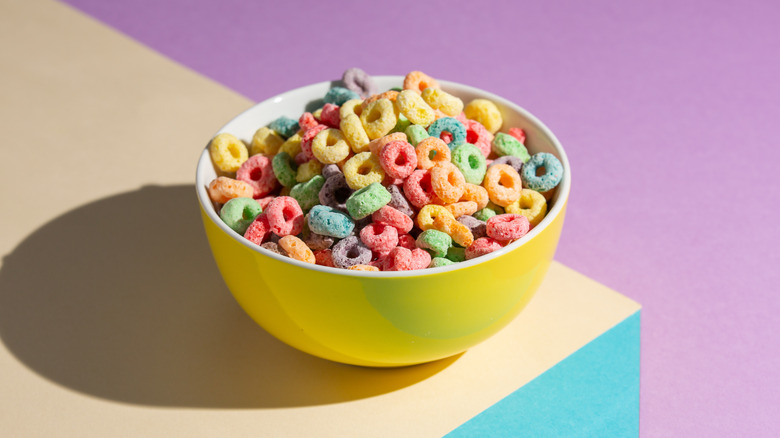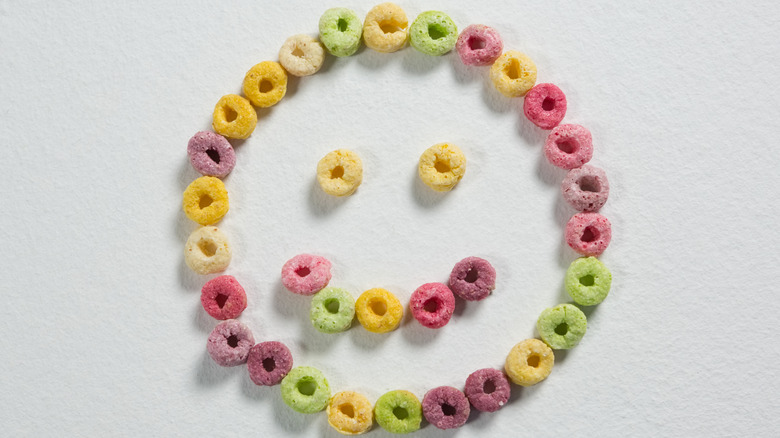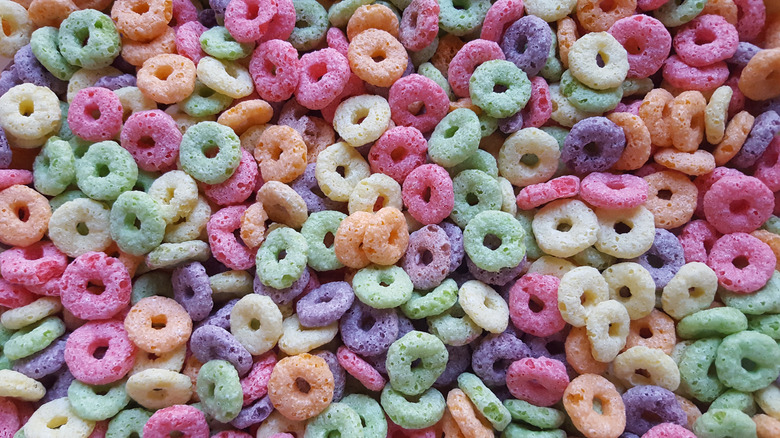The Lawsuit That Made Kellogg's Change The Original Froot Loops Name
When you're browsing the aisles of your local grocery store, you're probably going to find some products that are branded misleadingly. Most people likely operate under the assumption that food companies are being somewhat secretive when disclosing their ingredients. Still, the obfuscation of a product's makeup can become problematic for a corporation.
For example, Coca-Cola's brand Vitaminwater was faced with legal action over the brand's lofty and ultimately unsupportable health claims. That's something to remember the next time you browse the beverage aisle. (Similarly, Subway recently went through an issue where it was revealed that the meat mixture used in its tuna sandwiches could not legally be called tuna. In fact, when tested, one franchise location's tuna salad proved to be a mix of several different land-dwelling animals.)
If you're walking down the cereal aisle, you're probably aware that there isn't going to be a lot of fresh produce. Nevertheless, it's precisely this issue that forced Kellogg's to change the name of one of its most famous cereals.
Was Froot Loops forced to change its natural name?
In 1959, Kellogg's apparently introduced the world to a new cereal. It consisted of multicolored rings, and a bowl of the novel breakfast treat tasted like a field full of fruit. Appropriately, they were called Fruit Loops. However, some people were upset at the name, as they felt that Kellogg's was falsely claiming that its cereal's flavor came from natural ingredients. A lawsuit, Paxton v. Kellogg's, ultimately resulted in the company changing the name of its cereal to one that is instantly recognizable among modern consumers: Froot Loops.
However, a deeper dive into this story reveals that the entire story of Paxton v. Kellogg's is likely apocryphal. Kellogg's officially states that Froot Loops were first released in 1963 and makes no mention of the legal battle over the product's fruit content. Froot Loops may have as much sugar as candy, but none of it comes from real fruit. In fact, the cereal is primarily sweetened with just that — straight-up sugar.
Lawsuits over truth in advertising are far from rare
Though it doesn't seem like Kellogg's was ever made to change the name of Froot Loops, the name of its ubiquitous colorful cereal has been the subject of numerous attacks. Roy Werbel, a passionate cereal consumer from San Francisco, sued Kellogg's on behalf of everyone who believed that the breakfast cereal contains real fruit and is, therefore, healthy. Werbel also sued PepsiCo over the company's Crunch Berries cereal.
In 2020, there was a large rally in Sydney, Australia, during which hundreds of demonstrators demanded that Kellogg's change the name of Froot Loops. In Australia, fruit loop is often used as a pejorative against the mentally disabled.
Other Kellogg's products have also come under legal scrutiny. Super Mario Fruit Snacks and Pop Tarts were the focus of separate class action lawsuits, both of which centered around the company's advertising claims that the products contain real fruit. Furthermore, Kellogg's settled with the FTC and retracted its claim that Frosted Mini Wheats were able to improve children's attentiveness.
Kellogg's isn't the only corporation forced to play the name game. Some fast food restaurants used to have completely different names – Kentucky Fried Chicken became KFC when the Commonwealth of Kentucky trademarked its name.


